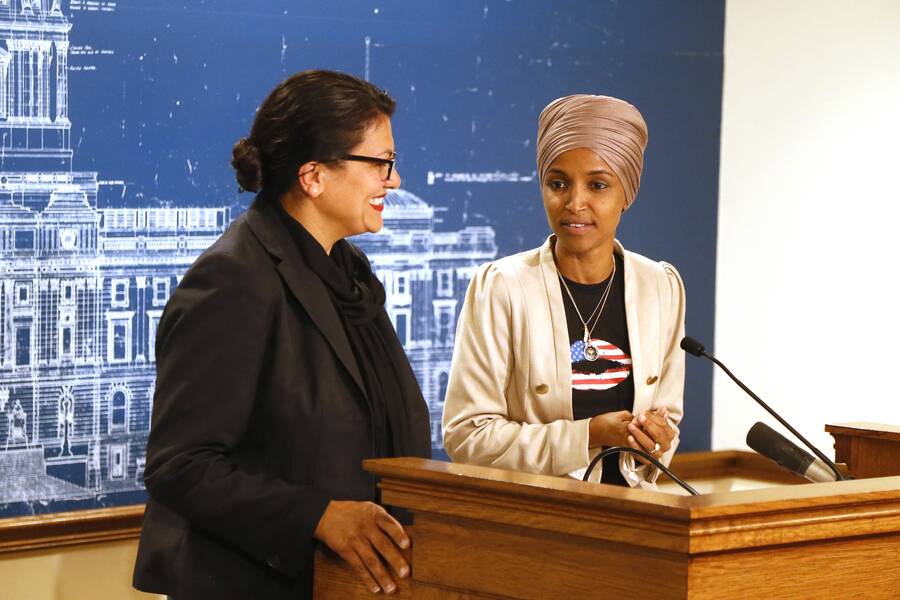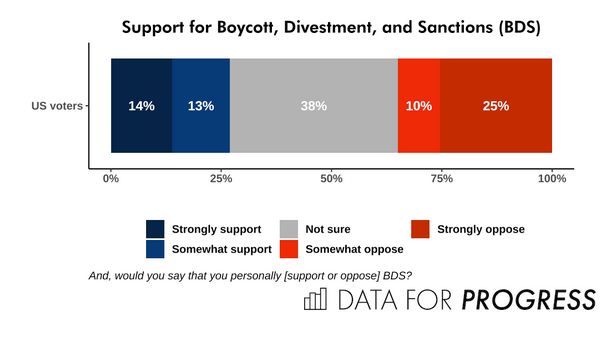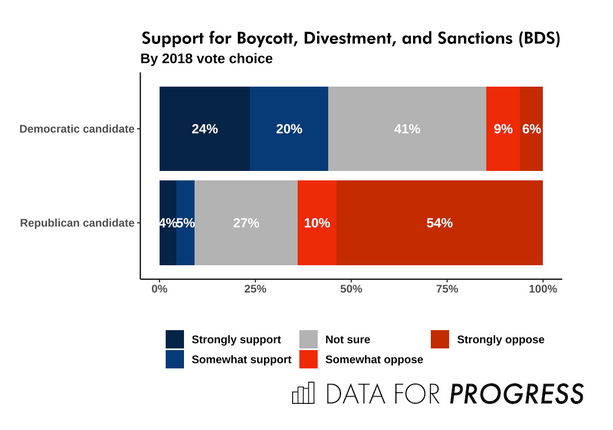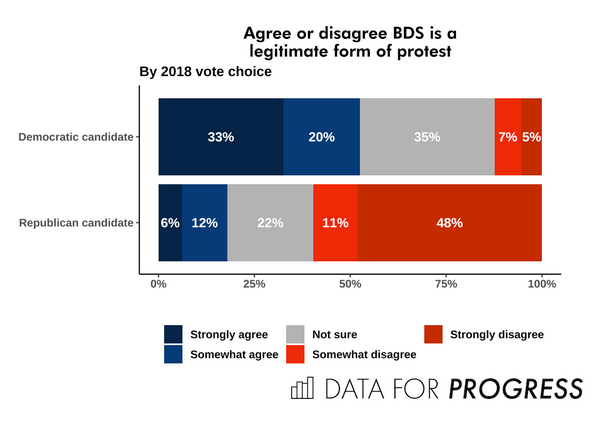Poll: Democrats Are Divided on BDS
A new Data for Progress survey shows no consensus for or against boycotting Israel, and many voters remain undecided.

THIS WEEK, Secretary of State Mike Pompeo announced that the United States no longer regards Israeli settlements in the West Bank as a violation of international law. The week before, the State Department condemned a ruling from the European Union’s highest court requiring labels on settlement products. The two-state solution—the longstanding official policy goal of the US—requires differentiation between the settlements, located inside a future state of Palestine, and the state of Israel itself. As the governments of both Israel and the US make it increasingly clear that they refuse that distinction, Data for Progress polled US voters on a tactic that also does not distinguish between Israel and its occupation.
Boycott, Divestment, and Sanctions (BDS) is a nonviolent movement launched in 2005 in response to a call from Palestinian civil society, aimed at pressuring Israel into recognizing Palestinian rights. The BDS movement demands an end to the occupation of the West Bank, East Jerusalem, Gaza, and the Golan Heights; the dismantling of the separation wall; full equality for Palestinian citizens of Israel; and recognition of the right of return for Palestinian refugees.
Most American Jewish establishment institutions strongly oppose BDS. Meanwhile, Josh Nathan-Kazis has reported on how BDS efforts on college campuses in the US have drawn intense scrutiny and attempts at repression, most prominently from Canary Mission, a project funded by secretive nonprofits. Israeli border agents have used Canary Mission profiles to deport BDS advocates; the FBI has interrogated activists based on the site. State and local governments have joined the push to curtail BDS: at least 26 states have laws or executive orders in place that penalize individuals and companies that boycott Israel. As the ACLU has noted, two different federal courts have ruled that anti-boycott legislation is a violation of the First Amendment.
Though most elected Democrats oppose anti-BDS laws, very few prominent Democrats actually support the boycotts. Freshman Reps. Ilhan Omar and Rashida Tlaib are the sole members of Congress to support BDS; because of that stance, Benjamin Netanyahu—at Donald Trump’s behest—briefly banned the lawmakers from Israel/Palestine this summer. Democratic 2020 presidential candidate Joe Biden applauded J Street U’s anti-BDS work in 2016, and has not spoken publicly about anti-BDS laws. The rest of the leading presidential 2020 candidates—Bernie Sanders, Elizabeth Warren, Pete Buttigieg, and Kamala Harris—all oppose BDS as well as anti-BDS laws, the latter on free speech grounds.
However, that near-unanimity is not reflected in voter opinion. New polling from Data for Progress shows that while a plurality of US voters oppose BDS, 35% to 27%, a similar plurality of voters say that BDS is a legitimate tactic, 36% to 31%, and oppose anti-BDS laws, 36% to 27%. Among Democratic voters, a majority, 53%, say that BDS is legitimate, and 44% support BDS. Nearly half of Democratic voters, 48%, oppose anti-BDS laws, while only 15% support them.

More than a third of US voters are not sure about their stance on BDS, its legitimacy, or anti-BDS legislation—an unusually high proportion, even compared to Data for Progress’s polling on other foreign policy-related topics. More than two-thirds of voters who are not sure about their support for BDS are women, and more than half voted for a Democrat in 2018.
From September 13th to 16th, YouGov Blue conducted an online poll for Data for Progress of a national sample of 1,006 US voters. We asked a set of questions about voters’ support for boycotts in general and for BDS in particular, as well as questions about whether they see boycotts and BDS as legitimate forms of protest.
The questions read:
Boycotts are a nonviolent activist tactic designed to pressure businesses or governments to change their positions by refusing to do business with them. Supporters say boycotts are an effective, non-violent tactic to make change and are protected under the First Amendment. Opponents say boycotts are hypocritical and unfair since it is impossible to boycott everyone who is doing something objectionable. Do you [agree or disagree] that boycotts are a legitimate form of protest?
In general, would you say you [support or oppose] the use of boycotts?
Some people advocate for boycotts, divestment, and sanctions of Israel, or “BDS,” as a nonviolent protest tactic to pressure Israel into withdrawing their occupation of Palestine. For example, BDS supporters advocate for institutions such as universities to boycott and divest from G4S, a company that provides services and equipment to Israeli prisons. Supporters of BDS say that Israel violates the human rights of Palestinians and that BDS is protected by the First Amendment. Opponents say that BDS delegitimizes the state of Israel and that BDS singles out Israel—rather than other human rights abusers—because of anti-Semitism. Do you [agree or disagree] that BDS is a legitimate form of protest?
And, would you say that you personally [support or oppose] BDS?
Some states have passed anti-BDS laws, which can prohibit BDS supporters from access to government contracts. For example, a school speech pathologist in Texas lost her job with a school district for refusing to sign a contract with an anti-BDS clause. Supporters say that the US government shouldn’t do business with people who weaken our allies, like Israel. Opponents say that anti-BDS laws violate the First Amendment. Do you [support or oppose] anti-BDS laws?
There is a clear partisan split in the responses, with Democrats far more favorably inclined to BDS than Republicans. Democratic voters support BDS, 44% to 15%, with another 41% not sure. Only 6% of Democratic voters strongly oppose BDS. Republican voters, on the other hand, oppose BDS 64% to 9%, while 27% are not sure. A majority of Republican voters, 54%, strongly oppose BDS.

A majority of Democratic voters say BDS is legitimate: 53% agree, while 12% disagree, and 35% are not sure. Republican voters disagree, 60% to 18%, and 22% are not sure.

Democratic voters oppose anti-BDS laws, 48% to 15%, with 37% unsure. Republican voters support the laws, 44% to 27%, and 29% are not sure.
For Data for Progress, I analyzed the survey responses in detail, according to factors such as voting behavior in 2018, party identification, education level, and frequency of religious service attendance. Below, I have examined the data by voter age, race, household income, and gender, with an additional look at white evangelical Christians. Some of the numbers below may not add up to precisely 100% due to rounding.
Age
Young voters are the most likely to be unsure about BDS: 47% of voters age 18–29 say they are not sure whether they support BDS. Voters age 18–29 are almost evenly split on BDS: 27% oppose it, and 26% support it.
Voters age 30–44 are the only age group to support BDS, at 33% in support to 25% opposing, with 41% unsure.
Voters age 45–54 narrowly oppose BDS: 30% oppose BDS, 27% support it, and 44% are unsure.
Among voters age 55–64, 39% oppose BDS, 28% support it, and 33% are not sure.
Voters age 65 and older are most likely to oppose BDS, and least likely to be unsure about it: they oppose BDS, 49% to 22% (including 40% who strongly oppose), and 29% are not sure. Voters over age 65 make up 39% of those who strongly oppose BDS, though they are only 25% of the survey sample.
Among voters between the ages of 30 and 64, 72–76% support the use of boycotts and 16–17% oppose them. Slightly fewer voters age 18–29 support the use of boycotts: 70% to 20%. Voters over age 65 are the least likely to support the use of boycotts, and the most likely to oppose them: they support the use of boycotts 66% to 25%.
There is significant variation among age groups in seeing BDS as a legitimate form of protest, even as voters agree across age groups that boycotts in general are legitimate. Between 70% and 80% of voters of all age groups agree that boycotts are a legitimate form of protest. However, younger voters are much more likely than older voters to say that BDS is legitimate: 42% of voters age 18–29 and 43% of voters age 30–44 say BDS is legitimate, while only 27% of voters age 65 or older agree—and 45% disagree, including 36% who strongly disagree.
Voters age 18–29 oppose anti-BDS laws, 33% to 23%, with 44% unsure. Voters age 30–44 oppose the laws 38% to 28%, while 34% are unsure. Voters age 45–54 oppose the laws, 34% to 22%, and 44% say they are unsure. Voters age 55–64 oppose anti-BDS laws 38% to 30%, with 32% unsure. Voters age 65 and older oppose the laws 37% to 31%, with 32% unsure.
Race
Voters of color support BDS, 35% to 24%, though 42% are unsure. White voters oppose BDS, 39% to 24%, with another 37% not sure. Voters of color are slightly more likely than white voters to support the use of boycotts in general: white voters support the use of boycotts, 70% to 20%, whereas voters of color support them 76% to 16%.
White voters and voters of color say that boycotts are a legitimate protest tactic at about the same rate: 76% of white voters and 74% of voters of color agree. Voters of color agree more strongly, with 51% of voters of color compared to 41% of white voters saying they strongly agree.
A plurality of voters of color also agree that BDS is legitimate, 46% to 19%, with another 35% not sure. A plurality of white voters narrowly disagree—36% say BDS is not legitimate, 33% say it is, and 32% are not sure.
White voters oppose anti-BDS laws, 36% to 30%, with another 35% not sure. Voters of color oppose anti-BDS laws 37% to 21%, with 41% not sure.
Gender
Women narrowly oppose BDS, 27% to 24%, while men oppose it 44% to 30%. Women are significantly more likely than men to say they are not sure about their stance on BDS: nearly half of women surveyed, 48%, said they were not sure, compared to about a quarter of men, 26%. These gender differences are almost nonexistent in opinions about boycotts in general: men support the use of boycotts, 70% to 22%, while women support boycotts 73% to 16%.
A plurality of women voters say that BDS is legitimate: 33% agree that it is and 26% say it is not, and 42% of women say they are not sure. Men are much more certain, and more narrowly split: 40% of men say BDS is legitimate, 37% say it is not legitimate, and 22% are not sure. There is almost no difference between men’s and women’s views of the legitimacy of boycotts in general: women agree that boycotts are legitimate, 75% to 13%, and men agree 76% to 16%.
Men oppose anti-BDS laws, 40% to 33%, with 27% unsure. Women are most likely to be unsure about the laws, at 44%, but oppose them 33% to 23%.
White Evangelical Christians
Among white voters who are born-again/evangelical Christians, a majority, 53%, oppose BDS, including 47% who strongly oppose. Only 13% of white born-again voters support BDS, and 35% are unsure.
Nearly half of white born-again voters disagree that BDS is a legitimate form of protest, 48% to 18%, including 41% who strongly disagree that BDS is legitimate. Another 33% are not sure.
Forty percent of white born-again voters support anti-BDS laws, while 26% oppose them and 33% are not sure.
Conclusion
Donald Trump and Mitch McConnell have made it clear that they will use BDS as a wedge issue in the 2020 elections, attempting to drive Jews away from the Democratic Party by painting BDS as antisemitic and all Democrats as BDS supporters. In responding to these efforts, Democratic elected officials and candidates should keep in mind that the share of their voters who strongly oppose BDS is very small, and that many of the voters they need have not yet made up their minds on BDS. Activists should note that boycotts are widely seen as a legitimate tactic among voters of both parties, but particularly by Democratic voters. While BDS has more opponents in the electorate than supporters, the fact that more than a third of voters decline to take a position on it suggests that voters, unlike the political establishment and mainstream Jewish institutions, have not ruled BDS out.
Emma Saltzberg is an organizer, strategist, and researcher who lives and attends many Jewish potlucks in Brooklyn. She is a co-founder of IfNotNow.